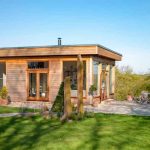How Covid has changed the rules for garden offices
The rise in workers needing an office space at home has pushed the case for garden offices to be allowed through permitted development…
Demand for Garden Buildings
Over the past 18 months the world of working from home has been opened to a wider proportion of the population than ever before.
As last spring’s lockdown proved that many workers did not need to go into the office (at least not on a full-time basis), it is clear that working from home is going to become more the norm than ever before. Just a quick scan of office-based vacancies shows that many companies are now offering at least an opportunity to combine working from home with days in the office.
That brings us of course to the next problem – where is your home office going to be? Unless you are lucky enough to have a spare room that can serve its purpose, or the money to splash out on an extension, there’s just one option remaining – the garden. Garden buildings have been growing in popularity for a while – usually being used as home gyms, cinemas or games rooms. The key point is that the outbuilding must be “required for a purpose incidental to the enjoyment of the dwelling’’. Essentially, this means that it cannot be used as extra bedroom accommodation.
Planning a Garden Office
However, it appears that creating a home office is justification in the eyes of one Planning Inspector. Take a recent appeal, where a large garden outbuilding had been refused. The Planning Inspector said the key factor in deciding the appeal was whether the outbuilding could be considered as being required for purposes incidental to the enjoyment of the dwelling as such. They also took into account the nature and scale of use.
The Inspector also judged that a home office is more likely to be an incidental use rather than an integral part of the ordinary residential use as a dwelling. Having considered the appellants’ home, and the fact that they both worked from home, the inspector decided that the main dwelling would not have the interior space or facilities to allow both residents to work at home for a sustained period. He also noted that the office would need to be away from the general disturbance and noise of a family home – ie, the kitchen or living room – and that the layout of the main dwelling would not accommodate that.
So, the conclusion was that the activities the outbuilding was designed to house could not be contained within the main dwelling and that the outbuilding was not excessive in size for this purpose, and so the Inspector opined that the outbuilding would constitute permitted development under Schedule 2, Part, Class E of the Town and Country Planning (General Permitted Development) Order.
This example is interesting, as it highlights that Inspectors are questioning typical local authority resistance to proposals for outbuildings under permitted development rights and, factoring recent events and the ‘new norm’, siding with appellants, agreeing that they will be built for uses ‘incidental’ to the main usage of the dwelling house.
Incidental Use
The pandemic has helped to show that even though an office can theoretically and practically be accommodated within houses, it is not always easy to work from home. Many homeowners sacrifice dining rooms or bedrooms. But trying to work within living areas of a home when children are around, for instance, is challenging to say the least – with noise and other distractions ten-a-penny. The interesting point here, as far as permitted development and planning permission is concerned, is that erecting outbuildings to facilitate home working and still allowing rooms to fulfil their intended purpose within the dwelling is acknowledged as being incidental.
Another unusual appeal came to our attention where the appellant wanted to use a garden outbuilding as a sculpture and stone casting/carving room. It showed that the appellant is responsible for proving that the use of the proposed building is incidental. In this case, they showed that sculpture was a hobby that they had previously undertaken in rented premises, the cost of which was now prohibitive. Because the appellant proved they had a job, they were able to show that sculpture was a hobby. The Inspector was satisfied that the outbuilding was not unusual in size and that the particular features of sculpture (producing dust and mess, and the need to store materials) meant there was a need for separate rooms.
These two appeals go to show that there appears to be more leeway now, concerning garden outbuildings for working from home or hobby use, and that if you have applied for permission for a garden office or similar in the past and been refused, it may be worth revisiting your plans in this post-pandemic environment, albeit it is clear that justification to support your case is paramount.
The Future
Looking ahead however, what is clear from the past 18 months and where it seems we are still heading, more and more companies will allow or even expect staff to work at home, too. Consequently, it is hoped that housebuilders and architects will quickly factor this new requirement into the homes they design and build. It is clear this will have cost implications due to the impact larger dwellings/curtilages will have on development density, as well as the cost of construction. Fewer dwellings per hectare and higher construction costs may affect land prices or even the cost of purchasing a new home. These things may deter some housebuilders from meeting this growing requirement, therefore, we question whether it is something that the Government might mandate, perhaps through the Nationally Described Space Standards?
If you would like to discuss your own project with us or just find out more about what we do, please continue to browse the website or drop us a line at info@apexplanning.co.uk without obligation.

